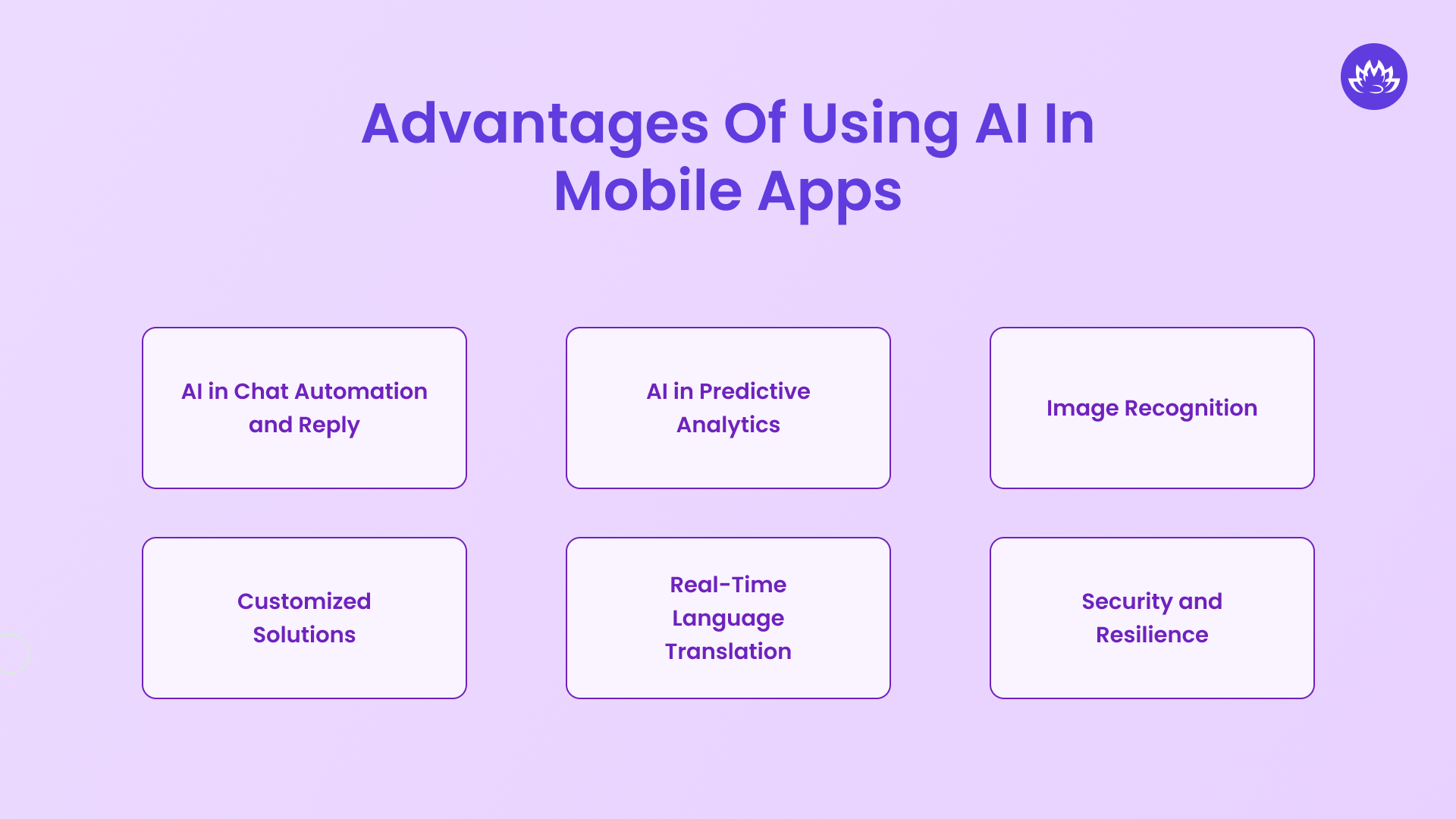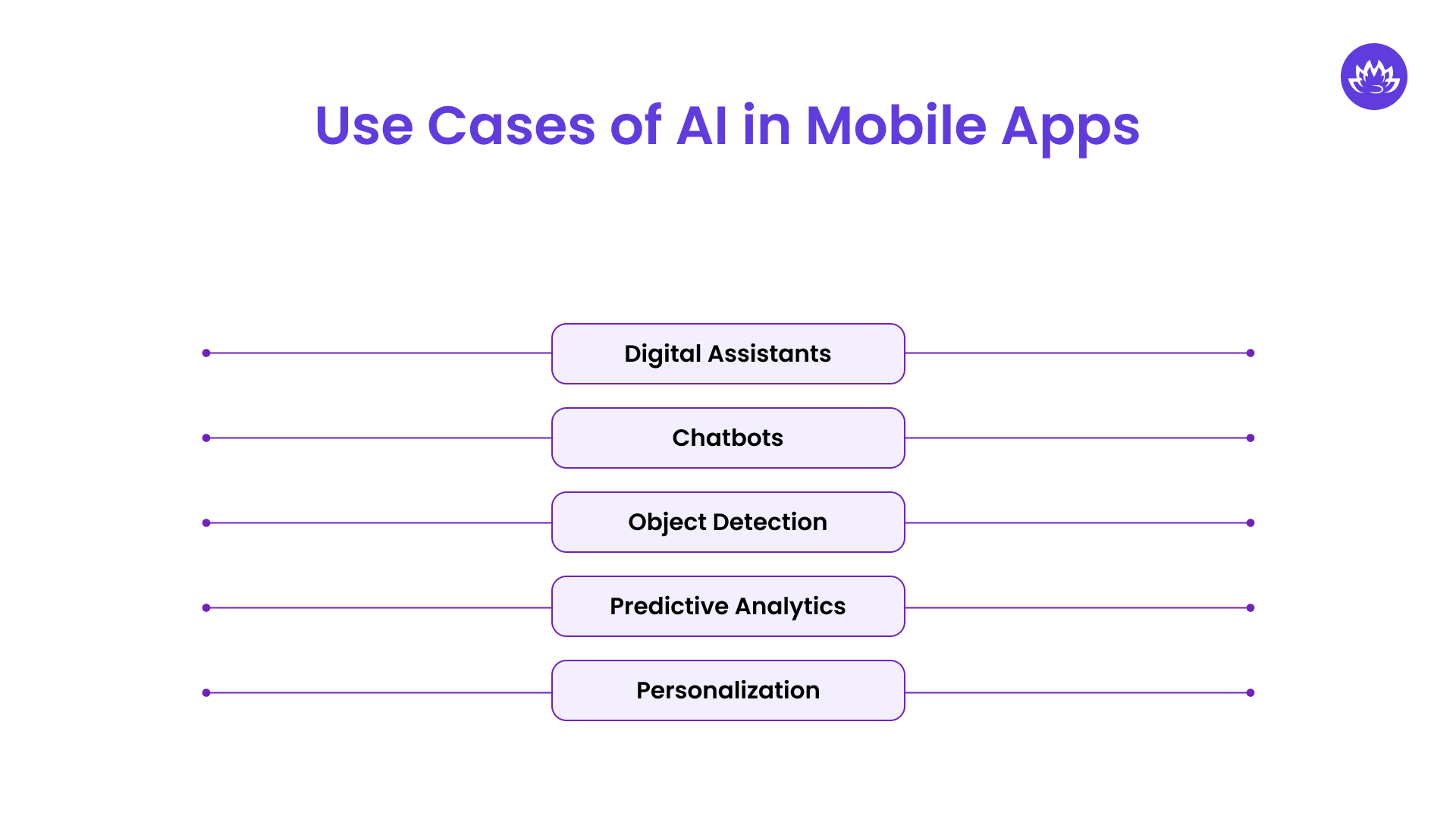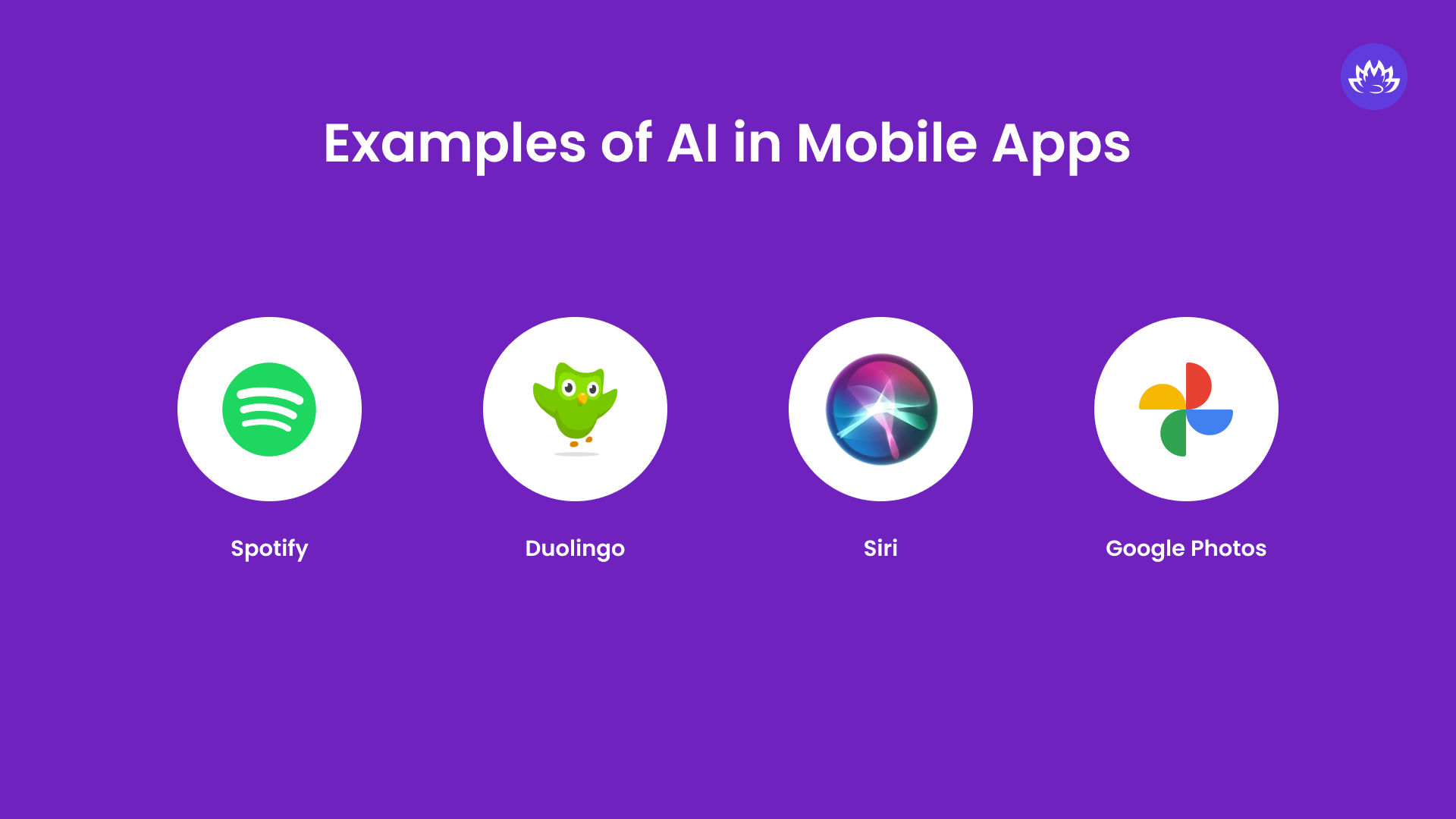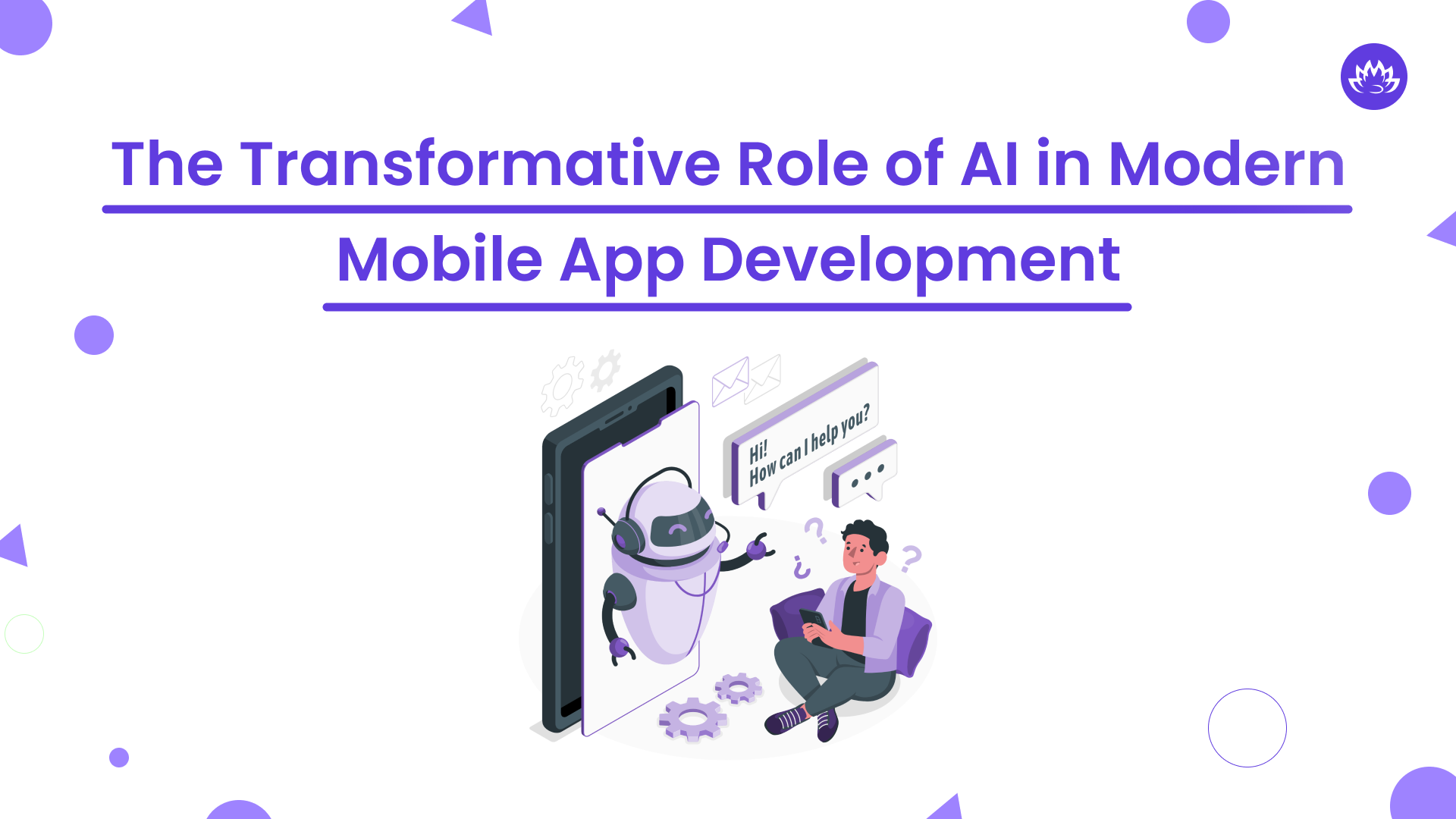AI plays a big part in mobile app development since it not only helps you create extremely complex apps that meet the demands of current businesses, but it also transforms the process of developing these apps. AI-powered features, predictive analytics, user behavior analysis, or you name it, AI mobile apps assist companies in providing users with specialized solutions through a variety of methods. According to Grand View Research, the global AI in mobile applications market is projected to grow at a 36.6% CAGR from 2024 to 2030.
Mobile apps change in different ways with the changing times. AI is crucial to the creation of mobile apps because it allows developers to create more complex apps and significantly alters how users interact with conventional mobile apps. It even surpasses the capabilities of conventional applications. Hence, it is necessary to develop mobile apps with AI.
Numerous cutting-edge capabilities, such as chatbots for automated chats, predictive analysis to analyze users’ past searches and forecast future trends, and many more, are integrated into AI-powered mobile apps, making them incredibly user-friendly and business-oriented.
With AI in mobile app development, mobile apps become more responsive and intelligent tools that provide users with customized solutions. Before hiring an AI development company, read this blog post about the significance of artificial intelligence in mobile app development to understand its role in the process!
Current Impact of AI in Mobile App Development
Artificial intelligence, in its broadest sense, refers to the intelligence displayed by machines, particularly computer systems. AI in mobile app development is often a branch of computer science research that examines and creates techniques and applications that allow machines to sense their environment and use intelligence to take the right actions and accomplish their intended goals.
Predictive analytics, automated chats, and customized solutions are just a few of the many benefits that AI-powered mobile apps offer, making them essential for both companies and mobile app development service providers. Another stat shows the market size of AI in mobile apps is expected to reach around $249.8 bn by 2033, as compared to $16.7 bn in 2023.
Any reputable mobile app development company will utilize this technology to streamline its development process, increase efficiency, and shorten the time-to-market for its services, in addition to incorporating AI-powered features into mobile apps. AI-automated mobile app testing, intelligent code review tools, AI copilots for development, and other methods can help achieve this.
Advantages of Using AI in Mobile Apps

Numerous advantages, such as voice recognition, image identification, chatbots, and predictive analytics, underscore the significance of artificial intelligence in mobile apps. Here are some of the important ones:
AI in Chat Automation and Reply
Chatbots and AI app development excel at responding automatically without requiring human intervention. A humanoid conversational experience is offered by the conversational user interface (UI) of several AI-enabled programs, such as Google Assistant, Alexa, and Duolingo.
Chatbots provide users with an interactive experience and round-the-clock support, making it easy for mobile apps to engage with users.
AI in Predictive Analytics
Using machine learning algorithms and user data, predictive analytics is an AI-powered feature in mobile app development. In data assessment, predictive analytics uses the user’s search intent, browsing history, and browsing history to identify what the user is truly seeking for and offer appropriate answers.
In mobile app development, predictive analytics enables companies to identify and offer tailored mobile AI solutions to their target clientele.
Image Recognition
Mobile apps with artificial intelligence can recognize images, which simplifies a number of processes. AI image recognition technology is used in mobile apps by companies in a variety of industries, including social media, eCommerce, and healthcare. To identify particular characteristics and patterns in an image, it uses machine learning techniques.
In order to address health issues, healthcare apps can also use AI to evaluate medical imagery such as MRIs and X-rays.
Customized Solutions
According to user behavior, machine learning (ML), a branch of artificial intelligence (AI) combined with natural language processing (NLP), offers a realistic interface. It ensures long-term engagement by assisting your app in learning from the user’s actions and particular patterns to ascertain what the user is truly looking for and offer them customized options.
Real-Time Language Translation
Businesses can incorporate AI-enabled translators into their mobile apps for a smooth and instantaneous language translation service, due to artificial intelligence. Microsoft Translator, Notta, and Google Translate are a few instances of real-time language translators.
Additionally, a smartphone app that uses AI for real-time language translation enables users to speak with people worldwide without being interrupted by language hurdles.
Security and Resilience
A biometric authentication function is included in AI-enabled mobile apps to verify a user’s identity and authorize access to important data. Strong and cutting-edge features, such as voice recognition, gesture control, facial recognition, and sensory recognition, are frequently added to these applications.
Data protection against hacking and numerous other cybersecurity risks is assured by the high-performance security function. The function, which provides robust protection for users, is crucial for the banking and finance sectors.
Top Use Cases of AI in Mobile Apps

AI has numerous uses in mobile applications, ranging from chatbots to digital assistants and personalization. The functionality of these apps has been completely transformed by AI, making it easier for consumers to conduct their daily business. Check out some examples of how AI-powered mobile apps are being used!
Digital Assistants
Among the best real-world examples of digital assistants are Google Assistant, Apple’s Siri, and Amazon’s Alexa. These virtual assistants utilize voice recognition technology to recognize both the searcher’s voice and the meaning of what is being spoken, with the intention of executing the necessary orders.
With the help of digital assistants, users can interact with apps without having to click on them.
Chatbots
Lily from Duolingo, Ora from Sephora, and Kuki AI are all excellent examples of AI-powered chatbots utilized in mobile applications. They automate message systems that offer 24/7 personalized chat solutions without requiring human involvement. They frequently respond to user inquiries, resolving them promptly. Natural language processing, or NLP, enables AI-powered chatbots to comprehend customer requests with ease and react accordingly.
Object Detection
Will visual searches be given priority in your prospective mobile app? Using AI-enabled object recognition technology is essential in this case. A mobile app’s object detection feature uses AI to find things, places, people, and other pertinent factors. Examples of AI object detection tools in mobile apps include Google Lens, Pinterest Lens, Amazon Shopping, and Snapchat.
Predictive Analytics
What if you could predict future demands and provide them with what they truly need, regardless of your industry—retail, banking, healthcare, etc.? Predictive analytics can be used for this. This is aided by AI predictive analytics in mobile apps. By evaluating consumers’ past data, predictive analytics makes it possible to forecast future requirements and plan accordingly.
Personalization
Mobile apps with AI capabilities often monitor user behavior and preferences, giving you insight into their top preferences. This feature enables you to know current user information and offer tailored solutions based on their individual requirements.
Actual Examples of AI in Mobile Apps

After learning about AI’s use in mobile apps, you should be familiar with some actual instances of AI-enabled apps. The top AI-based mobile apps that demonstrate the transformative power of AI through automation, customization, and interactive elements across a range of industries are listed below:
Spotify
With the use of AI and various algorithms, it is able to create a highly personalized listening experience by evaluating listening habits and preferences, and providing personalized music suggestions and curated playlists, such as Discover Weekly, based on user preferences.
Duolingo
Duolingo is a fantastic example of a language-learning program that uses artificial intelligence (AI) to customize solutions based on the user’s performance and learning style. With the aid of AI, the app provides extra learning resources to users who are having trouble with particular ideas in order to assist them get back on track.
Siri
An outstanding example of AI software development, it is a voice-activated virtual assistant that uses natural language processing (NLP) to comprehend and react appropriately to user commands, answer queries, issue commands, and perform a number of tasks without the need for human intervention.
Google Photos
It uses machine learning and sophisticated AI image recognition to tag and classify images automatically. It facilitates image organization and search. Additionally, it can emphasize memories and make photo albums with AI’s assistance.
Best Ways To Utilize AI in Mobile Apps

Generally speaking, the process of integrating AI into a mobile application is not significantly different from other software development processes. Not all processes are likely to be the same, even though many of them are. The procedures listed below should be taken into account for a successful AI integration in mobile apps!
Identify Your Difficulties
Describe the issues you’re having and hope AI integration will help you overcome. Assess thoroughly and identify certain problems and issues that AI can help with, as it allows you to avoid adding extra features and incurring significant costs.
Assess the data.
Think about conducting a thorough data analysis prior to integrating AI into mobile applications. First and foremost, know where your data originates from and which trustworthy sources you can trust. If necessary, utilize the data analytics tool to effectively manage and arrange your important data so that it stays consistent with the AI module.
Integration of AI
You’re ready to proceed with integrating AI into mobile apps now that you’ve identified the difficulties and evaluated the data. You must possess experience and knowledge of AI technology to complete this phase. To achieve the desired outcome, make sure your AI engineers and developers are skilled in artificial intelligence; if not, you can hire dedicated developers in AI from a reputable company.
Establish Metrics for Measurement
Establish metrics to assess the app’s performance once it has been constructed. You obviously expect benefits because you developed a mobile app that uses artificial intelligence. As a result, think about establishing precise objectives and measurements to evaluate and know the amount of value your app provides. Being informed about what your app has to offer allows you to make timely decisions that will increase profitability.
The Future of Artificial Intelligence in Mobile Apps
The use of AI in mobile apps has a bright future. By enhancing the general functionality, it is revolutionizing how apps communicate with consumers. In the coming years, smartphone apps will become increasingly intuitive and tailored, thanks to the advancement of artificial intelligence.
Augmented reality (AR) and virtual reality (VR) integration will be crucial in making these apps more immersive and enhancing the user experience by providing built-in interactive AR/VR experiences. Proactive AI help will also become more widely used, whether it be for proactive user needs prediction or for making helpful recommendations in advance.
Conclusion
AI’s real-time analysis of massive datasets guarantees peak performance and ongoing development. Incorporating AI into mobile app development not only solves present issues but also puts companies at the forefront of innovation, giving them a competitive edge in a market that is changing quickly. The smooth integration of AI into mobile apps will revolutionize how people use technology on a daily basis.
You can rely on us to put your resources to work in bringing your AI-powered mobile app idea to life. Whitelotus Corporation is a trusted mobile app development company with hundreds of satisfied customers worldwide. Hire dedicated developers from our company and take advantage of our full-fledged mobile app development capabilities combined with artificial intelligence skills to realize your full commercial potential.
Author

Sunil is a result-orientated Chief Technology Officer with over a decade of deep technical experience delivering solutions to startups, entrepreneurs, and enterprises across the globe. Have led large-scale projects in mobile and web applications using technologies such as React Native, Flutter, Laravel, MEAN and MERN stack development.
View all posts









